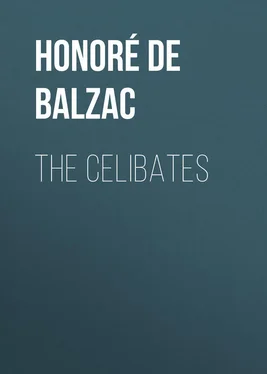Honoré Balzac - The Celibates
Здесь есть возможность читать онлайн «Honoré Balzac - The Celibates» — ознакомительный отрывок электронной книги совершенно бесплатно, а после прочтения отрывка купить полную версию. В некоторых случаях можно слушать аудио, скачать через торрент в формате fb2 и присутствует краткое содержание. Жанр: literature_19, foreign_antique, foreign_prose, на английском языке. Описание произведения, (предисловие) а так же отзывы посетителей доступны на портале библиотеки ЛибКат.
- Название:The Celibates
- Автор:
- Жанр:
- Год:неизвестен
- ISBN:нет данных
- Рейтинг книги:4 / 5. Голосов: 1
-
Избранное:Добавить в избранное
- Отзывы:
-
Ваша оценка:
- 80
- 1
- 2
- 3
- 4
- 5
The Celibates: краткое содержание, описание и аннотация
Предлагаем к чтению аннотацию, описание, краткое содержание или предисловие (зависит от того, что написал сам автор книги «The Celibates»). Если вы не нашли необходимую информацию о книге — напишите в комментариях, мы постараемся отыскать её.
The Celibates — читать онлайн ознакомительный отрывок
Ниже представлен текст книги, разбитый по страницам. Система сохранения места последней прочитанной страницы, позволяет с удобством читать онлайн бесплатно книгу «The Celibates», без необходимости каждый раз заново искать на чём Вы остановились. Поставьте закладку, и сможете в любой момент перейти на страницу, на которой закончили чтение.
Интервал:
Закладка:
Brigaut's mind was made up as he sat there thinking. He went back to Paris and fetched his certificate, tools, and baggage, and three days later he was a journeyman in the establishment of Monsieur Frappier, the best cabinet-maker in Provins. Active, steady workmen, not given to junketing and taverns, are so rare that masters hold to young men like Brigaut when they find them. To end Brigaut's history on this point, we will say here that by the end of the month he was made foreman, and was fed and lodged by Frappier, who taught him arithmetic and line drawing. The house and shop were in the Grand'Rue, not a hundred feet from the little square where Pierrette lived.
Brigaut buried his love in his heart and committed no imprudence. He made Madame Frappier tell him all she knew about the Rogrons. Among other things, she related to him the way in which their father had laid hands on the property of old Auffray, Pierrette's grandfather. Brigaut obtained other information as to the character of the brother and sister. He met Pierrette sometimes in the market with her cousin, and shuddered to see the heavy basket she was carrying on her arm. On Sundays he went to church to look for her, dressed in her best clothes. There, for the first time, he became aware that Pierrette was Mademoiselle Lorrain. Pierrette saw him and made him a hasty sign to keep out of sight. To him, there was a world of things in that little gesture, as there had been, a fortnight earlier, in the sign by which she told him from her window to run away. Ah! what a fortune he must make in the coming ten years in order to marry his little friend, to whom, he was told, the Rogrons were to leave their house, a hundred acres of land, and twelve thousand francs a year, not counting their savings!
The persevering Breton was determined to be thoroughly educated for his trade, and he set about acquiring all the knowledge that he lacked. As long as only the principles of his work were concerned he could learn those in Provins as well as in Paris, and thus remain near Pierrette, to whom he now became anxious to explain his projects and the sort of protection she could rely on from him. He was determined to know the reason of her pallor, and of the debility which was beginning to appear in the organ which is always the last to show the signs of failing life, namely the eyes; he would know, too, the cause of the sufferings which gave her that look as though death were near and she might drop at any moment beneath its scythe. The two signs, the two gestures – not denying their friendship but imploring caution – alarmed the young Breton. Evidently Pierrette wished him to wait and not attempt to see her; otherwise there was danger, there was peril for her. As she left the church she was able to give him one look, and Brigaut saw that her eyes were full of tears. But he could have sooner squared the circle than have guessed what had happened in the Rogrons' house during the fortnight which had elapsed since his arrival.
It was not without keen apprehension that Pierrette came downstairs on the morning after Brigaut had invaded her morning dreams like another dream. She was certain that her cousin Sylvie must have heard the song, or she would not have risen and opened her window; but Pierrette was ignorant of the powerful reasons that made the old maid so alert. For the last eight days, strange events and bitter feelings agitated the minds of the chief personages who frequented the Rogron salon. These hidden matters, carefully concealed by all concerned, were destined to fall in their results like an avalanche on Pierrette. Such mysterious things, which we ought perhaps to call the putrescence of the human heart, lie at the base of the greatest revolutions, political, social or domestic; but in telling of them it is desirable to explain that their subtle significance cannot be given in a matter-of-fact narrative. These secret schemes and calculations do not show themselves as brutally and undisguisedly while taking place as they must when the history of them is related. To set down in writing the circumlocutions, oratorical precautions, protracted conversations, and honeyed words glossed over the venom of intentions, would make as long a book as that magnificent poem called "Clarissa Harlowe."
Mademoiselle Habert and Mademoiselle Sylvie were equally desirous of marrying, but one was ten years older than the other, and the probabilities of life allowed Celeste Habert to expect that her children would inherit all the Rogron property. Sylvie was forty-two, an age at which marriage is beset by perils. In confiding to each other their ideas, Celeste, instigated by her vindictive brother the priest, enlightened Sylvie as to the dangers she would incur. Sylvie trembled; she was terribly afraid of death, an idea which shakes all celibates to their centre. But just at this time the Martignac ministry came into power, – a Liberal victory which overthrew the Villele administration. The Vinet party now carried their heads high in Provins. Vinet himself became a personage. The Liberals prophesied his advancement; he would certainly be deputy and attorney-general. As for the colonel, he would be made mayor of Provins. Ah, to reign as Madame Garceland, the wife of the present mayor, now reigned! Sylvie could not hold out against that hope; she determined to consult a doctor, though the proceeding would only cover her with ridicule. To consult Monsieur Neraud, the Liberal physician and the rival of Monsieur Martener, would be a blunder. Celeste Habert offered to hide Sylvie in her dressing-room while she herself consulted Monsieur Martener, the physician of her establishment, on this difficult matter. Whether Martener was, or was not, Celeste's accomplice need not be discovered; at any rate, he told his client that even at thirty the danger, though slight, did exist. "But," he added, "with your constitution, you need fear nothing."
"But how about a woman over forty?" asked Mademoiselle Celeste.
"A married woman who has had children has nothing to fear."
"But I mean an unmarried woman, like Mademoiselle Rogron, for instance?"
"Oh, that's another thing," said Monsieur Martener. "Successful childbirth is then one of those miracles which God sometimes allows himself, but rarely."
"Why?" asked Celeste.
The doctor answered with a terrifying pathological description; he explained that the elasticity given by nature to youthful muscles and bones did not exist at a later age, especially in women whose lives were sedentary.
"So you think that an unmarried woman ought not to marry after forty?"
"Not unless she waits some years," replied the doctor. "But then, of course, it is not marriage, it is only an association of interests."
The result of the interview, clearly, seriously, scientifically and sensibly stated, was that an unmarried woman would make a great mistake in marrying after forty. When the doctor had departed Mademoiselle Celeste found Sylvie in a frightful state, green and yellow, and with the pupils of her eyes dilated.
"Then you really love the colonel?" asked Celeste.
"I still hoped," replied Sylvie.
"Well, then, wait!" cried Mademoiselle Habert, Jesuitically, aware that time would rid her of the colonel.
Sylvie's new devotion to the church warned her that the morality of such a marriage might be doubtful. She accordingly sounded her conscience in the confessional. The stern priest explained the opinions of the Church, which sees in marriage only the propagation of humanity, and rebukes second marriages and all passions but those with a social purpose. Sylvie's perplexities were great. These internal struggles gave extraordinary force to her passion, investing it with that inexplicable attraction which, from the days of Eve, the thing forbidden possesses for women. Mademoiselle Rogron's perturbation did not escape the lynx-eyed lawyer.
Читать дальшеИнтервал:
Закладка:
Похожие книги на «The Celibates»
Представляем Вашему вниманию похожие книги на «The Celibates» списком для выбора. Мы отобрали схожую по названию и смыслу литературу в надежде предоставить читателям больше вариантов отыскать новые, интересные, ещё непрочитанные произведения.
Обсуждение, отзывы о книге «The Celibates» и просто собственные мнения читателей. Оставьте ваши комментарии, напишите, что Вы думаете о произведении, его смысле или главных героях. Укажите что конкретно понравилось, а что нет, и почему Вы так считаете.












